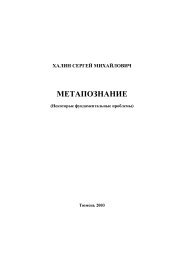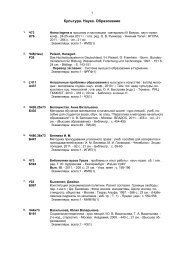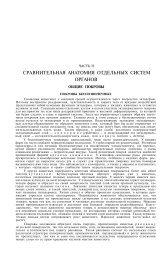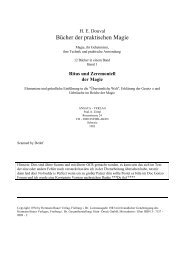The Economic History of Byzantium - Dumbarton Oaks
The Economic History of Byzantium - Dumbarton Oaks
The Economic History of Byzantium - Dumbarton Oaks
Create successful ePaper yourself
Turn your PDF publications into a flip-book with our unique Google optimized e-Paper software.
982 NICOLAS OIKONOMIDES<br />
p. 997). <strong>The</strong> kapnikon was indeed collected many years before the reign <strong>of</strong> Empress<br />
Irene, who was deposed in 802. 19 It would appear, then, that the tax was devised by<br />
the Isaurian emperors.<br />
<strong>The</strong> compilation <strong>of</strong> a cadaster was, <strong>of</strong> course, a much more complex task. <strong>The</strong> Roman<br />
Empire had drawn up summary land registers, in which broad geographical areas<br />
were shown with an indication <strong>of</strong> the number <strong>of</strong> estates located in each. It is not certain<br />
whether Justinian attempted to compile a detailed land register. Even ifsuch a fiscal<br />
instrument had been prepared, it would surely have been unable to survive the turmoil<br />
<strong>of</strong> the late sixth and seventh centuries. Nor would it appear that the land register was<br />
complete at the end <strong>of</strong> the reign <strong>of</strong> Irene (802), since <strong>The</strong>odore <strong>of</strong> Stoudios refers to<br />
the continued use <strong>of</strong> an oath as a means <strong>of</strong> proving taxable assets. Nikephoros I, Irene’s<br />
successor, ordered a general revision <strong>of</strong> the land register. After that time, and to the<br />
eleventh century, the Byzantine system <strong>of</strong> land taxation was based on a land register<br />
that was systematically updated, thus drastically reducing disputes over taxation between<br />
civil servants and taxpayers. 20<br />
Ownership <strong>of</strong> land also became the basis for financing part <strong>of</strong> the individual’s obligation<br />
<strong>of</strong> military service to the state. <strong>The</strong> service appears to have been an obligation in<br />
the nature <strong>of</strong> a tax; this becomes comprehensible in the light <strong>of</strong> what we know about<br />
the system <strong>of</strong> the strateia from the ninth to the eleventh century. 21<br />
In two texts from the mid-eighth century—a paragraph in the Ecloga <strong>of</strong> the Isaurians<br />
and a court decision attributed to Leo III or Constantine V—we find references to<br />
soldiers who were owners or joint owners <strong>of</strong> land, who bought and maintained their<br />
armament from the money produced by their land, and who contributed the salary<br />
(roga) they earned when on campaign to the family budget. 22 In other words, these<br />
were soldiers from rural areas who relied on their landholdings to maintain themselves,<br />
presumably because their status as soldiers secured them certain privileges to<br />
which wehave notestimony for the period in question but which are known to us in<br />
later times.<br />
Soldiers who were simultaneously owners <strong>of</strong> land are also mentioned by <strong>The</strong>ophanes,<br />
in reference to the year 810. 23 <strong>The</strong>odore <strong>of</strong> Stoudios wrote in 801 about the<br />
widows <strong>of</strong> soldiers who were obliged to pay “a wretched and inhuman demand” (ejleeinh`n<br />
kaì ajpánqrwpon ejxapaíthsin) because <strong>of</strong> the death <strong>of</strong> their husbands—in other<br />
19 <strong>The</strong>ophanes, 487; <strong>The</strong>ophanes Continuatus, ed. I. Bekker (Bonn, 1838), 54.<br />
20 <strong>The</strong>odori Studitae Epistulae, ed. G. Fatouros, 2 vols. (Berlin, 1992), vol. 1, no. 7, lines 35–41 (hereafter<br />
<strong>The</strong>odore <strong>of</strong> Stoudios); <strong>The</strong>ophanes, 486.<br />
21 Ihave studied the texts that follow in “Middle Byzantine Provincial Recruits: Salary and Armament,”<br />
in Gonimos: Neoplatonic and Byzantine Studies Presented to Leendert G. Westerink at 75, ed. J. Duffy<br />
and J. Peradotto (Buffalo, N.Y., 1988), 121–36. For a different view <strong>of</strong> the matter, see J. Haldon,<br />
“Military Service, Military Lands and the Status <strong>of</strong> Soldiers: Current Problems and Interpretations,”<br />
DOP 47 (1993): 1–67.<br />
22 Ecloga, ed. L. Burgmann (Frankfurt, 1983), 220–22; D. Simon, “Byzantinische Hausgemeinschaftsverträge,”<br />
in Beiträge zur europäischen Rechtsgeschichte und zum geltenden Zivilrecht, Festgabe für Johannes<br />
Sontis, ed. F. Baur, K. Larenz, and F. Wieacker (Munich, 1977), 94.<br />
23 <strong>The</strong>ophanes, 486.








